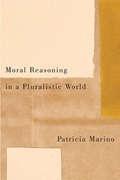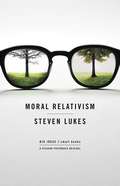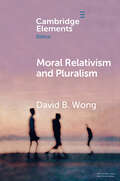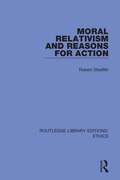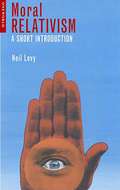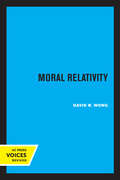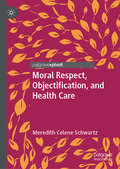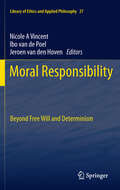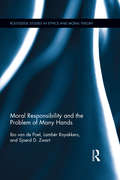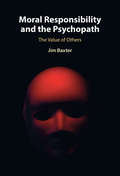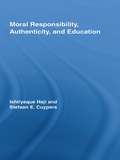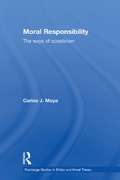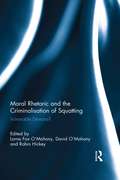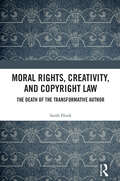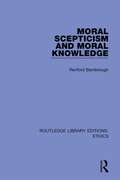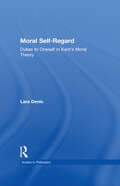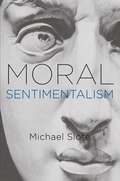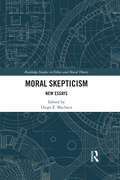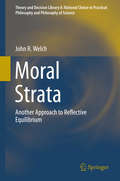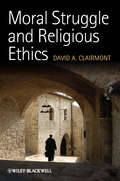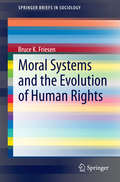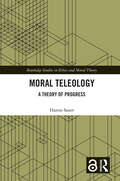- Table View
- List View
Moral Reasoning in a Pluralistic World
by Patricia MarinoMoral diversity is a fundamental reality of today’s world, but moral theorists have difficulty responding to it. Some take it as evidence for skepticism – the view that there are no moral truths. Others, associating moral reasoning with the search for overarching principles and unifying values, see it as the result of error. In the former case, moral reasoning is useless, since values express individual preferences; in the latter, our reasoning process is dramatically at odds with our lived experience. Moral Reasoning in a Pluralistic World takes a different approach, proposing an alternative way of thinking about moral reasoning and progress by showing how diversity and disagreement are compatible with theorizing and justification. Patricia Marino demonstrates that, instead of being evidence for skepticism and error, moral disagreements often arise because we value things pluralistically. This means that although people share multiple values such as fairness, honesty, loyalty, and benevolence, we interpret and prioritize those values in various ways. Given this pluralistic evaluation process, preferences for unified single-principle theories are not justified. Focusing on finding moral compromises, prioritizing conflicting values, and judging consistently from one case to another, Marino elaborates her ideas in terms of real-life dilemmas, arguing that the moral complexity and conflict we so often encounter can be part of fruitful and logical moral reflection. Aiming to draw new connections and bridge the gap between theoretical ethics and applied ethics, Moral Reasoning in a Pluralistic World offers a sophisticated set of philosophical arguments on moral reasoning and pluralism with real world applications.
Moral Relativism
by Steven LukesMoral relativism attracts and repels. What is defensible in it and what is to be rejected? Do we as human beings have no shared standards by which we can understand one another? Can we abstain from judging one another's practices? Do we truly have divergent views about what constitutes good and evil, virtue and vice, harm and welfare, dignity and humiliation, or is there some underlying commonality that trumps it all? These questions turn up everywhere, from Montaigne's essay on cannibals, to the UN Declaration of Human Rights, to the debate over female genital mutilation. They become ever more urgent with the growth of mass immigration, the rise of religious extremism, the challenges of Islamist terrorism, the rise of identity politics, and the resentment at colonialism and the massive disparities of wealth and power between North and South. Are human rights and humanitarian interventions just the latestform of cultural imperialism? By what right do we judge particular practices as barbaric? Who are the real barbarians? In this provocative new book, the distinguished social theorist Steven Lukes takes an incisive and enlightening look at these and other challenging questions and considers the very foundations of what we believe, why we believe it, and whether there is a profound discord between "us" and "them. "
Moral Relativism and Chinese Philosophy: David Wong and His Critics (SUNY series in Chinese Philosophy and Culture)
by Yang Xiao and Yong HuangOriginal, influential, and often controversial, ethicist David Wong defends forms of moral relativism. His 1984 Moral Relativity was a study of this concept, and his 2006 Natural Moralities presented a new and sophisticated account of it. Wong's vision is of a pluralistic moral relativism; he does not defend all forms of relativism but evaluates what moralities may be true. His singular philosophy reflects his deep knowledge of Confucian and Daoist thought.In this book, moral philosophers and scholars of Chinese thought debate ideas central to Wong's work and Wong responds to them. The discussion ranges widely, including exploring Wong's thought on naturalism, criteria for moralities, the principle of charity, moral authority, and the concept of community, and looking at his readings of Xunzi and Zhuangzi. Wong's nuanced and forceful responses clarify and develop further arguments in his work. These engaging and critical exchanges between Wong and his critics illuminate not only Wong's thought, but also contemporary ethical theory and Chinese philosophy.
Moral Relativism and Moral Objectivity
by Gilbert Harman Judith J. ThomsonDo moral questions have objective answers? In this great debate, Gilbert Harman explains and argues for relativism, emotivism, and moral scepticism. In his view, moral disagreements are like disagreements about what to pay for a house; there are no correct answers ahead of time, except in relation to one or another moral framework. Independently, Judith Jarvis Thomson examines what she takes to be the case against moral objectivity, and rejects it; she argues that it is possible to find out the correct answers to some moral questions. In her view, some moral disagreements are like disagreements about whether the house has a ghost. Harman and Thomson then reply to each other. This important, lively accessible exchange will be invaluable to all students of moral theory and meta-ethics.
Moral Relativism and Pluralism (Elements in Ethics)
by David B. WongThe argument for metaethical relativism, the view that there is no single true or most justified morality, is that it is part of the best explanation of the most difficult moral disagreements. The argument for this view features a comparison between traditions that highly value relationship and community and traditions that highly value personal autonomy of the individual and rights. It is held that moralities are best understood as emerging from human culture in response to the need to promote and regulate interpersonal cooperation and internal motivational coherence in the individual. The argument ends in the conclusion that there is a bounded plurality of true and most justified moralities that accomplish these functions. The normative implications of this form of metaethical relativism are explored, with specific focus on female genital cutting and abortion.
Moral Relativism and Reasons for Action
by Robert StreifferOriginally published in 2003, this book examines moral relativism and the author discusses the main arguments for Appraiser Relativism and Agent Relativism. The final chapter of the book discusses the implication of some recent developments in metaethics and develops a theory of reasons for action based on the way in which an action can be good as an alternative to the desire-based, agent-centred account critiqued in the earlier chapters.
Moral Relativism: A Short Introduction
by Neil LevyThis enlightening new introduction examines the history and development of moral relativism, considering the arguments for and against, and also covering such key topics as terrorism, and the rights of women in oppressive cultures.
Moral Relativity
by David B. WongThis title is part of UC Press's Voices Revived program, which commemorates University of California Press’s mission to seek out and cultivate the brightest minds and give them voice, reach, and impact. Drawing on a backlist dating to 1893, Voices Revived makes high-quality, peer-reviewed scholarship accessible once again using print-on-demand technology. This title was originally published in 1984.
Moral Respect, Objectification, and Health Care
by Meredith Celene SchwartzThis book fills an important gap in existing health care ethics literature by describing an egalitarian conception of moral respect which applies to autonomous and non-autonomous patients alike. It reframes questions about respect, from its target to the role that respect plays in our moral lives. Taking into account various forms of objectification, it suggests that the unique role of moral respect is to recognize a person as more than a mere object; to recognize them as an equally intrinsically valuable being who possesses dignity. Further, the book argues that respect is central to health care because medicine and experiences of illness are both inherently objectifying. Objectification is sometimes morally permissible, and other times morally troubling—a context of respect can help to distinguish between these situations. Because we can reduce others to mere objects in ways other than violating or denying their autonomy, the approach presented here can also accommodate non-autonomous patients directly without considering them as marginal cases.
Moral Responsibility
by Ibo van de Poel Jeroen Van Hoven Nicole A. VincentIt is well over a decade since John Fischer and Mark Ravizza - and before them, Jay Wallace and Daniel Dennett - defended responsibility from the threat of determinism. But defending responsibility from determinism is a potentially endless and largely negative enterprise; it can go on for as long as dissenting voices remain, and although such work strengthens the theoretical foundations of these theories, it won't necessarily build anything on top of those foundations, nor will it move these theories into new territory or explain how to apply them to practical contexts. To this end, the papers in this volume address these more positive challenges by exploring how compatibilist responsibility theory can be extended and/or applied in a range of practical contexts. For instance, how is the narrow philosophical concept of responsibility that was defended from the threat of determinism related to the plural notions of responsibility present in everyday discourse, and how might this more fine-grained understanding of responsibility open up new vistas and challenges for compatibilist theory? What light might compatibilism shed, and what light might be shed upon it, by political debates about access to public welfare in the context of responsibility for one's own health, and by legal debates about the impact of self-intoxication on responsibility. Does compatibilist theory, which was originally designed to cater for analysis of individual actions, scale to scenarios that involve group action and collective responsibility -- e.g. for harms due to human-induced climate change? This book's chapters deal with a range of theoretical problems discussed in classic compatibilist literature -- e.g. the relationship between responsibility and capacity, the role of historical tracing in discounting the exculpatory value of incapacities, and the justifiability of retributive punishment. But instead of motivating their discussions by focusing on the alleged threat that determinism poses to responsibility, these chapters' authors have animated their discussions by tackling important practical problems which crop up in contemporary debates about responsibility.
Moral Responsibility and the Problem of Many Hands (Routledge Studies in Ethics and Moral Theory)
by Lambèr Royakkers Ibo van de Poel Sjoerd D. ZwartWhen many people are involved in an activity, it is often difficult, if not impossible, to pinpoint who is morally responsible for what, a phenomenon known as the ‘problem of many hands.’ This term is increasingly used to describe problems with attributing individual responsibility in collective settings in such diverse areas as public administration, corporate management, law and regulation, technological development and innovation, healthcare, and finance. This volume provides an in-depth philosophical analysis of this problem, examining the notion of moral responsibility and distinguishing between different normative meanings of responsibility, both backward-looking (accountability, blameworthiness, and liability) and forward-looking (obligation, virtue). Drawing on the relevant philosophical literature, the authors develop a coherent conceptualization of the problem of many hands, taking into account the relationship, and possible tension, between individual and collective responsibility. This systematic inquiry into the problem of many hands pertains to discussions about moral responsibility in a variety of applied settings.
Moral Responsibility and the Psychopath: The Value of Others
by Jim BaxterAre psychopaths morally responsible? Should we argue with them? Remonstrate with them, blame them, sometimes even praise them? Is it worth trying to change them, or should we just try to prevent them from causing harm? In this book, Jim Baxter aims to find serious answers to these deep philosophical questions, drawing on contemporary insights from psychiatry, psychology, neuroscience and law. Moral Responsibility and the Psychopath is the first sustained, book-length philosophical work on this important and fascinating topic, and will be of deep interest and importance to researchers in these fields – not to mention anyone who has had to interact with a psychopath in their everyday life.
Moral Responsibility, Authenticity, and Education (Routledge International Studies in the Philosophy of Education)
by Stefaan E. Cuypers Ishtiyaque HajiThe primary purpose of this book is to explain the distinction, on the one hand, between indoctrination and education, and, on the other, between responsibility-subverting manipulation and mere causation. Both are elucidated by an appeal to common ground, an account of when our motivations and other springs of action are "truly our own" or "authentic." The book progresses from analyses of the sort of agency that responsibility requires and the authenticity of our motivations, together with a discussion of the relevance of these analyses to manipulation and related problems in the philosophy of education, to a defense of the thesis that responsibility from love's standpoint is of vital significance, and the implications of this thesis for what the authors deem to be legitimate goals of education and other issues in free will. Philosophers and advanced students working in free will, moral psychology, and the philosophy of education will find this text to be extremely useful.
Moral Responsibility: The Ways of Scepticism (Routledge Studies in Ethics and Moral Theory)
by Carlos MoyaWe are strongly inclined to believe in moral responsibility - the idea that certain human agents truly deserve moral praise or blame for some of their actions. However, recent philosophical discussion has put this natural belief under suspicion, and there are important reasons for thinking that moral responsibility is incompatible with both determinism and indeterminism, therefore potentially rendering it an impossibility. Presenting the major arguments for scepticism about moral responsibility, and subjecting them to sustained and penetrating critical analysis, Moral Responsibility lays out the intricate dialectic involved in these issues in a helpful and accessible way. A well-written and lively account, the book then goes on to suggest a way in which scepticism can be avoided, arguing that excessive pre-eminence given to the will might lie at its root. Offering an alternative to this scepticism, Carlos Moya shows how a cognitive approach to moral responsibility that stresses the importance of belief would rescue our natural and centrally important faith in the reality of moral responsibility.
Moral Rhetoric and the Criminalisation of Squatting: Vulnerable Demons?
by Lorna Fox O'Mahony David O'Mahony Robin HickeyThis collection of critical essays considers the criminalisation of squatting from a range of different theoretical, policy and practice perspectives. While the practice of squatting has long been criminalised in some jurisdictions, the last few years have witnessed the emergence of a newly constituted political concern with unlawful occupation of land. With initiatives to address the ‘threat’ of squatting sweeping across Europe, the offence of squatting in a residential building was created in England in 2012. This development, which has attracted a large measure of media attention, has been widely regarded as a controversial policy departure, with many commentators, Parliamentarians, and professional organisations arguing that its support is premised on misunderstandings of the current law and a precarious evidence-base concerning the nature and prevalence of ‘squatting’. Moral Rhetoric and the Criminalisation of Squatting explores the significance of measures to criminalise squatting for squatters, owners and communities. The book also interrogates wider themes that draw on political philosophy, social policy, criminal justice and the nature of ownership, to consider how the assimilation of squatting to a contemporary punitive turn is shaping the political, social, legal and moral landscapes of property, housing and crime.
Moral Rights and Their Grounds (Routledge Studies in Ethics and Moral Theory)
by David AlmMoral Rights and Their Grounds offers a novel theory of rights based on two distinct views. The first—the value view of rights—argues that for a person to have a right is to be valuable in a certain way, or to have a value property. This special type of value is in turn identified by the reasons that others have for treating the right holder in certain ways, and that correlate with the value in question. David Alm then argues that the familiar agency view of rights should be replaced with a different version according to which persons’ rights, and thus at least in part their value, are based on their actions rather than their mere agency. This view, which Alm calls exercise-based rights, retains some of the most valuable features of the agency view while also defending it against common objections concerning right loss. This book presents a unique conception of exercise-based rights that will be of keen interest to ethicists, legal philosophers, and political philosophers interested in rights theory.
Moral Rights, Creativity, and Copyright Law: The Death of the Transformative Author
by Sarah HookThis book argues that moral rights provisions in copyright law rest on a misunderstanding, or romanticisation, of the role of the author. The Romantic conception of authorship, as a lone genius, creating from nothing, sensitive and vulnerable, has helped publishers push for strong copyright reform. But is this conception borne out in practice – especially in a world of meme culture, of artificial intelligence generated art and poetry, and of open source and fan fiction? This book probes the romantic vignette of the author through its legal adoption. Moral rights are rights that attach to the non-economic – for example, intellectual or emotional – interests of an author in their work. Much like defamation, moral rights see the right of reputation as superior to the right of freedom of expression. However, unlike defamation, moral rights are not protecting against defamatory actions against a person. In most jurisdictions, they are provisions set within copyright regimes; regimes whose purpose is to incentivise innovation. Challenging the way we think about authorship and how it should be protected by law, the book draws on a wide range of historical and contemporary examples to demonstrate how moral rights can constitute a barrier to transformative creativity. While authors and artists require strong rights to protect their ability to earn an income and incentivise creativity, moral rights, the book argues, may in turn actually harm their ability to do so. This timely criticism of moral rights will appeal to researchers, students, policy makers and lawyers working in the area of intellectual property law, as well as legal theorists, sociolegal scholars and legal historians with relevant interests.
Moral Scepticism and Moral Knowledge
by Renford BambroughOriginally published in 1979, this book shows that a recognition of the rationality of moral judgment and moral action in no way involves us in diminishing our respect for liberty, authenticity, sincerity or integrity. It maintains that the resolution of these issues lies in recognising that the necessary involvement of the emotions in moral judgments and moral choices need not give rise to any hesitation or reluctance to treat moral questions as needing and permitting the use of the resources of human understanding.
Moral Self-Regard: Duties to Oneself in Kant's Moral Theory (Studies in Ethics)
by Lara DenisMoral Self-Regard draws on the work of Marcia Baron, Joseph Butler and Allen Wood, among others in this first extensive study of the nature, foundation and significance of duties to oneself in Kant's moral theory.
Moral Sentimentalism
by Michael SloteThere has recently been a good deal of interest in moral sentimentalism, but most of that interest has been exclusively either in metaethical questions about the meaning of moral terms or in normative issues about benevolence and/or caring and their place in morality. In Moral SentimentalismMichael Slote attempts to deal with both sorts of issues and to do so, primarily, in terms of the notion or phenomenon of empathy. Hume sought to do something like this over two centuries ago, though he didn't have the term "empathy" and used "sympathy" instead; and in effect Slote is seeking togive moral sentimentalism a "second wind" in and for contemporary circumstances. By relying systematically on empathy in its account of normative morality and in what it has to say about the meaning of moral vocabulary, Moral Sentimentalism offers a unified overall ethical picture that can then betested against ethical rationalism. Rationalism has recently dominated the scene in ethics, but by showing how sentimentalism can make coherent and intuitive sense of such preferred rationalist notions as autonomy, respect, and justice--and by showing how a sentimentalism based in empathy can dealwith ethically significant aspects of the moral life that rationalism tends to ignore or skimp on--Slote hopes a wider and more active debate between rationalism and sentimentalism can be set in motion. There are signs that sentimentalist modes of thought are gaining new footholds on the way ethicsis done, and this new book is very hopeful about these possibilities.
Moral Skepticism: New Essays (Routledge Studies in Ethics and Moral Theory)
by Diego E. MachucaMoral skepticism is at present a vibrant topic of philosophical inquiry. Particularly since the turn of the millennium, the debates between moral skeptics of various stripes and their opponents have gained renewed force not only by taking account of innovative ideas in moral philosophy, but also by drawing on novel positions in epistemology, metaphysics, and philosophy of language as well as on recent findings in empirical sciences. As a result, new arguments for and against moral skepticism have been devised, while the traditional ones have been reexamined. This collection of original essays will advance the ongoing debates about various forms of moral skepticism by discussing such topics as error theory, disagreement, constructivism, non-naturalism, expressivism, fictionalism, and evolutionary debunking arguments. It will be a valuable resource for academics and advanced students working in metaethics and moral philosophy more generally.
Moral Strata
by John R. WelchThis volume recreates the received notion of reflective equilibrium. It reconfigures reflective equilibrium as both a cognitive ideal and a method for approximating this ideal. The ideal of reflective equilibrium is restructured using the concept of discursive strata, which are formed by sentences and differentiated by function. Sentences that perform the same kind of linguistic function constitute a stratum. The book shows how moral discourse can be analyzed into phenomenal, instrumental, and teleological strata, and the ideal of reflective equilibrium reworked in these terms. In addition, the work strengthens the method of reflective equilibrium by harnessing the resources of decision theory and inductive logic. It launches a comparative version of decision theory and employs this framework as a guide to moral theory choice. It also recruits quantitative inductive logic to inform a standard of inductive cogency. When used in tandem with comparative decision theory, this standard can aid in the effort to turn the undesirable condition of reflective disequilibrium into reflective equilibrium.
Moral Struggle and Religious Ethics
by David A. ClairmontMoral Struggle and Religious Ethics offers a comparative discussion of the challenges of living a moral religious life. This is illustrated with a study of two key thinkers, Bonaventure and Buddhaghosa, who influenced the development of moral thinking in Christianity and Buddhism respectively.Provides an important and original contribution to the comparative study and practice of religious ethicsMoves away from a comparison of theories by discussing the shared human problem of moral weaknessOffers an fresh approach with a comparison of the understanding of the problem of moral weakness between the two key thinkers, Bonaventure and BuddhaghosaWritten by a highly respected academic in the dynamic and fast-growing field of comparative religious ethics
Moral Systems and the Evolution of Human Rights
by Bruce K. FriesenThis volume offers a comprehensible account of the development and evolution of moral systems. It seeks to answer the following questions: If morals are eternal and unchanging, why have the world's dominant religious moral systems been around for no more than a mere six thousand of the two hundred thousand years of modern human existence? What explains the many and varied moral systems across the globe today? How can we account for the significant change in moral values in one place in less than 100 years' time? Using examples from classical civilizations, the book demonstrates how increasing diversity compromises a moral system's ability to account for and integrate larger populations into a single social unit. This environmental stress is not relieved until a broader, more abstract moral system is adopted by a social system. This new system provides a sense of belonging and purpose for more people, motivating them to engage in prosocial (or moral) acts and refrain from socially disruptive selfish acts. The current human rights paradigm is the world's first universal, indigenous moral system. Because moral systems can be expected to continue to evolve, this book points to current boundaries of the human rights paradigm and where the next major moral revolution might emerge.
Moral Teleology: A Theory of Progress (Routledge Studies in Ethics and Moral Theory)
by Hanno SauerThis book develops a unified theory of moral progress. The author argues that there are mechanisms in place that consistently drive societies towards moral improvement and that a sophisticated, naturalistically respectable form of teleology can be defended. The book’s main aim is to flesh out the process of moral progress in more detail, and to show how, when the right mechanisms and institutions of moral progress are matched together, they create pressure for the desired types of moral gains to manifest. The first part of the book deals with two issues: the conceptual one about what moral progress is, and the broadly empirical one whether it is possible. It shows that cultural evolution successfully explains the origins of modern forms of morally welcome change. The second part argues that there is logical space for a moderate, scientifically credible form of teleology, and that the converse case for moral decline is weak. It addresses the types, drivers, and institutions of moral progress that allow for the storage, transmission, and cumulative improvement of our normative infrastructure over time. Finally, the third part demonstrates why moral progress cannot be accounted for in metaethically realist terms. Moral Teleology will be of interest to researchers and advanced students working in ethics, moral epistemology, and moral psychology.
